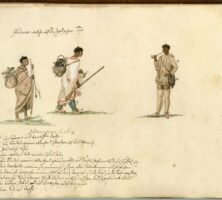Lachlan McGillivray’s American career coincided with Georgia’s colonial period and provides a guide to Georgia’s progress from one of dependence upon the Board of Trustees to self-government, and from a simple society to a more complex plantation society.
Born in Strathnairn, in Invernesshire, Scotland, in 1719, McGillivray belonged to the ancient Clan Chattan, traditionally headed by the McIntoshes. Members of the clan migrated to Charlestown (later Charleston), South Carolina, in the 1720s, and several achieved success in the Indian trade. There is evidence that young McGillivray came to America with the members of his clan who were recruited by James Oglethorpe to defend Georgia’s southern border and who founded the town of Darien, Georgia. Many of the Darien Scots, discouraged by privation and by the defeat of their leaders during Oglethorpe’s failed invasion of Florida, left Darien and joined their relatives in Charlestown.
McGillivray joined a company led by his relative, Archibald McGillivray, and obtained a license to trade in several villages in the Upper Creek country on the Coosa and Tallapoosa rivers, in present-day Alabama. He took over Archibald’s trading license in 1744 (Archibald named one of his sons Lachlan, and Lachlan left this child some money in his will). After Archibald McGillivray returned to Scotland, Lachlan McGillivray became a partner in the firm of Brown, Rae, and Company, based in Augusta. McGillivray achieved enormous influence as a trader among the Upper Creeks, as his partner, George Galphin, did among the Lower Creeks along the Chattahoochee River.
McGillivray’s post at Little Tallassee on the Coosa River was only a few miles from the French outpost of Fort Toulouse, located at the juncture of the Coosa and Tallapoosa rivers. McGillivray acted as an intelligence agent by informing the royal governors of South Carolina and Georgia about the French intrigues among the Creeks. McGillivray’s company lured a faction of Choctaws away from their traditional allegiance with the French in Louisiana. McGillivray enhanced his status by marrying Sehoy Marchand, the daughter of a French officer and a woman of the prestigious Wind Clan of the Creek Nation. Their union produced two girls and a boy. Their son, Alexander McGillivray, born in 1750, belonged to both cultures. Educated in Charlestown, he spoke and wrote perfect English and grew up to be the recognized leader of the Creek Nation.
McGillivray and his family moved to Augusta at the outset of the French and Indian War (1754-63). When the Cherokees attacked the outlying settlements in Georgia and South Carolina, he led some of his Creek friends against them. McGillivray and Galphin were largely instrumental in persuading the Creeks to come to Augusta in 1763 to cede a strip of land between the Savannah and Ogeechee rivers to Georgia. The two men later led surveying parties to mark the new boundary.
After the peace of 1763 McGillivray acquired two plantations outside Savannah, Vale Royal and Springfield, and entered a mercantile partnership with John Graham. His rise up the social ladder from Indian trader to planter-merchant mirrored Georgia’s transition from a slaveless society under the Trustees to a slave-owning commercial province in the model of South Carolina. As a member of the Georgia legislature and an officer in the militia, McGillivray cooperated with his former partners, John Rae and Galphin, in promoting settlement along the Ogeechee River. They recruited emigrants from Ireland to settle the township of Queensborough.
McGillivray never lost touch with his relatives in Scotland. He visited Strathnairn in 1770 and persuaded the chief of the McGillivrays, his cousin William, to come to Georgia. He transferred to William the title to Vale Royal, the rice plantation on Hutchinson Island. Another cousin, John McGillivray, became a prominent merchant in Mobile, Alabama, which had been acquired from the French in the recent war.
Back in Georgia McGillivray helped bring reluctant Creek chiefs to Augusta for another treaty and land session in 1773. By 1775 Revolutionary sentiment reached a critical point in Georgia. When provincial leaders met in Savannah on June 26, 1775, to draft protests against parliamentary taxation, they honored McGillivray by electing him to the chair, and the resolutions bore his signature. McGillivray refused, however, to renounce his allegiance to the king. When British warships appeared in the Savannah River, the Revolutionary leaders of Georgia arrested McGillivray and his cousin William and held them hostage along with Governor James Wright and other officials. The hostages managed to escape with the British ships.
McGillivray returned to Georgia with the restoration of royal government in 1779. His plantation became a battleground when French and American forces besieged Savannah in October 1779. After the Revolutionary War (1775-83) McGillivray returned to his native home in Invernesshire and acted as guardian of the young chief of the McGillivrays, John Lachlan. He continued to correspond with his son, Alexander, the headman of the Creek Nation, and he invited Alexander’s son to Scotland to be educated. McGillivray died at the age of eighty at his ancestral home, Dunmaglass, in Invernesshire in 1799.






